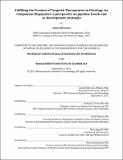Fulfilling the promise of targeted therapeutics in oncology via companion diagnostics : a perspective on pipeline trends and co-development strategies
Author(s)
Mehrotra, Anand
DownloadFull printable version (3.003Mb)
Other Contributors
Harvard University--MIT Division of Health Sciences and Technology.
Advisor
Richard J. Cohen, Keith Flaherty and Mara Aspinall.
Terms of use
Metadata
Show full item recordAbstract
Herceptin was the poster child of personalized medicine that brought forward the notion that contemporaneously developed companion diagnostics (CDx) could lead to more efficacious use of a cancer therapeutic in a selected population. Despite a gap of 12 years, the recent approvals of Zelboraf and Xalkori in quick succession by the FDA are a testament to the fact that the age of cancer therapeutics co-developed with a companion diagnostic is finally upon us. The purpose of this thesis was to test the hypotheses, that the trend for CDx based therapy launches in oncology is NOT headed towards a dramatic upturn in the next 5 years and in the view of biopharmaceutical executives - increasing price and market share of launched drugs are the dominant drivers for investing in companion diagnostics, and that the other features of CDx, such as improving the productivity of oncology drug development and reducing development costs are essentially dispensable. These hypotheses were tested using a study design that involved conducting a pilot study comprising of 18 interviews of stakeholders directly involved with the decision making of oncology drug development - to synthesize the extent of contemporaneously developed CDx to be launched with a cancer therapeutic in the coming 5 years. An analysis of the results obtained from the survey indicate, that a significant number of oncology drug launches within this decade would feature a co-developed companion diagnostic, and that despite challenges and initial trepidations over this business model - the higher probability of success, lower development costs, shorter time to market and pricing power associated with this approach, are incentives that are increasingly attracting more oncology firms to adopt this strategy for developing targeted therapeutics. Based on these findings, the original hypotheses were rejected.
Description
Thesis (S.M.)--Harvard-MIT Division of Health Sciences and Technology, 2011. This electronic version was submitted by the student author. The certified thesis is available in the Institute Archives and Special Collections. Cataloged from student submitted PDF version of thesis. Includes bibliographical references (p. [73-74]).
Date issued
2011Department
Harvard University--MIT Division of Health Sciences and TechnologyPublisher
Massachusetts Institute of Technology
Keywords
Harvard University--MIT Division of Health Sciences and Technology.